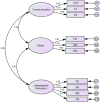Validation of the Simplified Chinese Psychoeducational Profile Third Edition in Mainland China
- PMID: 30542942
- PMCID: PMC6450835
- DOI: 10.1007/s10803-018-3827-z
Validation of the Simplified Chinese Psychoeducational Profile Third Edition in Mainland China
Abstract
The Psychoeducational Profile 3rd Edition (PEP-3) is a comprehensive assessment tool designed for children with autism spectrum disorder (ASD). Although its original English version has been validated, few validation studies have been conducted on translated versions including Chinese ones. Based on 554 Chinese children with ASD and 311 typically developing Chinese children as the control group, this study investigated the psychometric properties of a simplified Chinese PEP-3 (sCPEP-3) in China mainland. Psychometric evaluation of the sCPEP-3 showed satisfactory internal consistency, test-retest reliability, inter-rater reliability, convergent validity, construct validity, and factorial validity. The findings have several implications such as utilizing the sCPEP-3 in mainland China for customized educational program planning, early identification, and evaluating the treatment effects for children with ASD.
Keywords: Autism spectrum disorder; Caregiver Report; Performance Test; Psychoeducational Profile Third Edition; Simplified Chinese; Validation.
Conflict of interest statement
Conflict of interest
The authors declare that they have no conflict of interest.
Ethical Approval
All procedures performed in studies involving human participants were carried out in accordance with the ethical standards of the institutional and/or national research committee and with the 1964 Helsinki declaration and its later amendments or comparable ethical standards.
Informed Consent
Informed consent was obtained from all individual participants (or their parents, for child participants) included in the study.
Figures
Similar articles
-
Investigating the validation of the Chinese Mandarin version of the Social Responsiveness Scale in a Mainland China child population.BMC Psychiatry. 2017 Feb 6;17(1):51. doi: 10.1186/s12888-016-1185-y. BMC Psychiatry. 2017. PMID: 28166747 Free PMC article.
-
Psychometric properties of the chinese version of autism spectrum quotient-children's version: A sex-specific analysis.Autism Res. 2019 Feb;12(2):303-315. doi: 10.1002/aur.2053. Epub 2018 Dec 28. Autism Res. 2019. PMID: 30592171
-
Reliability, validity and developmental sensitivity of the Language Use Inventory (LUI) in the Chinese context.Int J Lang Commun Disord. 2022 May;57(3):497-511. doi: 10.1111/1460-6984.12693. Epub 2022 Jan 4. Int J Lang Commun Disord. 2022. PMID: 34984773 Free PMC article.
-
A systematic review of screening tools for the detection of autism spectrum disorder in mainland China and surrounding regions.Autism. 2020 Feb;24(2):285-296. doi: 10.1177/1362361319871174. Epub 2019 Aug 20. Autism. 2020. PMID: 31431046
-
Virtual environments as an assessment modality with pediatric ASD populations: a brief report.Child Neuropsychol. 2018 Nov;24(8):1129-1136. doi: 10.1080/09297049.2017.1375473. Epub 2017 Sep 13. Child Neuropsychol. 2018. PMID: 28903621
Cited by
-
Using Pivotal Response Treatment to Improve Language Functions of Autistic Children in Special Schools: A Randomized Controlled Trial.J Autism Dev Disord. 2024 Jun;54(6):2081-2093. doi: 10.1007/s10803-023-05988-7. Epub 2023 Apr 26. J Autism Dev Disord. 2024. PMID: 37101061 Free PMC article. Clinical Trial.
-
Psychoeducational Profile-Revised, Korean Wechsler Preschool and Primary Scale of Intelligence, Fourth Edition, and the Vineland Adaptive Behavior Scale, Second Edition: Comparison of Utility for Developmental Disabilities in Preschool Children.J Korean Acad Child Adolesc Psychiatry. 2023 Oct 1;34(4):258-267. doi: 10.5765/jkacap.230045. J Korean Acad Child Adolesc Psychiatry. 2023. PMID: 37841486 Free PMC article.
-
Efficacy and moderating factors of the Early Start Denver Model in Chinese toddlers with autism spectrum disorder: a longitudinal study.World J Pediatr. 2023 Aug;19(8):741-752. doi: 10.1007/s12519-022-00555-z. Epub 2022 Jun 13. World J Pediatr. 2023. PMID: 35697958 Clinical Trial.
-
Longitudinal changes in children with autism spectrum disorder receiving applied behavior analysis or early start denver model interventions over six months.Front Pediatr. 2025 May 14;13:1546001. doi: 10.3389/fped.2025.1546001. eCollection 2025. Front Pediatr. 2025. PMID: 40438784 Free PMC article.
-
Analysis of clinical and psychological characteristics of 225 children with autism spectrum disorder based on the C-PEP-3 scale.World J Psychiatry. 2025 Mar 19;15(3):101101. doi: 10.5498/wjp.v15.i3.101101. eCollection 2025 Mar 19. World J Psychiatry. 2025. PMID: 40110016 Free PMC article.
References
-
- Centers for Disease Control & Prevention Prevalence of autism spectrum disorder among children aged 8 years: Autism and developmental disabilities monitoring network, 11 sites, United States, 2010. Morbidity and Mortality Weekly Report: Surveillance Summaries. 2014;63(2):1–21. - PubMed
-
- Coonrod E, Marcus L. Psychoeducational profile—Revised (PEP-3) In: Volkmar FR, editor. Encyclopedia of autism spectrum disorders. New York: Springer; 2013. pp. 2439–2444.
-
- De Giacomo A, Craig F, Cristella A, Terenzio V, Buttiglione M, Margari L. Can PEP-3 provide a cognitive profile in children with ASD? A comparison between the developmental ages of PEP-3 and IQ of Leiter-R. Journal of Applied Research in Intellectual Disabilities. 2016;29(6):566–573. doi: 10.1111/jar.12216. - DOI - PubMed
Publication types
MeSH terms
Grants and funding
LinkOut - more resources
Full Text Sources
Medical
Molecular Biology Databases
Miscellaneous


